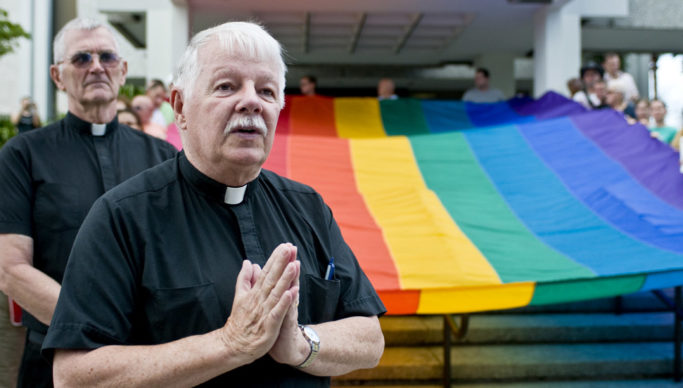
May Trans People Be Baptized? Yes, Says Catholic Church. But…
- By Elisha Goselin --
- 05 Dec 2023 --
Vatican doctrine permits the baptism of transgender people and allows them as well to serve as witnesses at Catholic weddings, according to a recently released document. Trans people are also allowed to be godparents at baptisms, and a child adopted or born through surrogacy with gay parents can be baptized.
The document, written by the section of the Vatican charged with overseeing matters of doctrine, states, “A transsexual — undergoing hormonal treatment and sex reassignment surgery — can be baptized, under the same conditions as other faithful, if there are no situations in which there is a risk of generating public scandal or disorientation in the faithful.”
In other words, there is a proviso.
The phrase “doesn’t cause scandal among the faithful” is a formulation denoting actions and behaviors which may lead others to sin. According to Catholic doctrine, homosexual activity is a sin, and an individual’s gender is that which was assigned at birth.
Though the document referred to was written five years ago, it was only lately made public as an answer to a question on the subject from Brazilian bishop, José Negri, regarding transgender and gay individuals.
The document also reminds the reader that while baptism has a “sanctifying grace,” it applies only if the individual repents of “serious sins.” One would assume that among those “serious sins” would be homosexual activity and/or changing one’s birth gender by artificial means.
Pope Francis, for his part, has opposed gender theory, especially as taught in schools, labeling it a form of “ideological colonization.” A decade ago he famously answered a question concerning gay priests with a reply beginning: “Who am I to judge?”
While stopping short of changing the church’s official view that homosexuality is “intrinsically disordered,” the pope has met and supported gay and trans people. During the pandemic he responded to a call for help from a small Roman church that serves trans women with food and money sent via the papal almoner, the official disburser of his philanthropy.
The following Easter when two busloads of trans women arrived at the Vatican for checkups and COVID-19 vaccines, officials asked Pope Francis if they should be allowed inside the gates. The pontiff ordered the gates opened for them, saying, “Ask for their names, ask for anything they need, but do not ask them about their sex.”
The Pope’s welcoming attitude toward those who have changed their birth gender is increasingly contrary to the changing views of American Catholics on the subject over the past few years. According to a Pew Research Center survey last year, the percentage of U.S. Catholics who felt that a person’s gender is determined by sex at birth went from 51 percent in 2017 to 62 percent in 2022, with the number who believed that one’s sex can be different from their sex at birth declined from 46 percent to 37 percent over the same period.
Likewise, the percentage of U.S. Catholic adults who say society has gone too far in accepting transgender people went from 27 in 2017 to 37 five years later.
The five-year-old document, while reflecting the Pope’s teachings on the sacrament of baptism, yet retains the view that if one comes to the baptismal altar with even the most sincere heart, if there is homosexual activity or transgender matters involved, that individual is still a sinner.
“Even when doubts remain regarding the objective morality of a person or about his subjective disposition toward grace,” the document states, “the aspect of the fealty of God’s unconditional love must never be forgotten, which is capable of building an irrevocable alliance even with the sinner and is always open to a development, albeit unpredictable.”



















